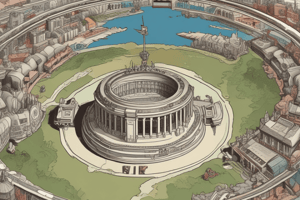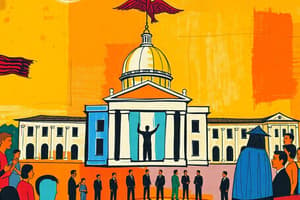Podcast
Questions and Answers
What does the concept of equality imply?
What does the concept of equality imply?
- Supremacy of one group over others
- No arbitrary discrimination (correct)
- Limited participation of citizens
- Total identity between individuals
Where is the principle of equality mentioned in the Constitution?
Where is the principle of equality mentioned in the Constitution?
- Article 1
- Article 20
- Article 30
- Article 15, number 2 (correct)
What is the main idea behind the concept of 'forming citizenship'?
What is the main idea behind the concept of 'forming citizenship'?
- Control of citizen's decisions
- Broad participation of citizens (correct)
- Limited access to education
- Restricted participation of citizens
Who is credited with the theory of 'separation of functions'?
Who is credited with the theory of 'separation of functions'?
What is the characteristic of 'legitimate authority'?
What is the characteristic of 'legitimate authority'?
What is the purpose of a constitution in achieving 'separation of functions'?
What is the purpose of a constitution in achieving 'separation of functions'?
What is one of the characteristics of universal suffrage?
What is one of the characteristics of universal suffrage?
What is the definition of government according to the RAE?
What is the definition of government according to the RAE?
What is the perception of political parties in the context of governance?
What is the perception of political parties in the context of governance?
Why was the right to vote made obligatory in Chile?
Why was the right to vote made obligatory in Chile?
What is the fundamental aspect of a system of government?
What is the fundamental aspect of a system of government?
What does the principle of 'personal' suffrage imply?
What does the principle of 'personal' suffrage imply?
What is a consequence of having an 'equal' suffrage?
What is a consequence of having an 'equal' suffrage?
What is the definition of democracy?
What is the definition of democracy?
What does the 'secret' suffrage principle guarantee?
What does the 'secret' suffrage principle guarantee?
What is the characteristic of direct democracy?
What is the characteristic of direct democracy?
What is the origin of representative democracy?
What is the origin of representative democracy?
What is a characteristic of direct suffrage?
What is a characteristic of direct suffrage?
What is the fundamental principle of representative democracy?
What is the fundamental principle of representative democracy?
According to Art 16, who can be suspended from exercising their right to vote?
According to Art 16, who can be suspended from exercising their right to vote?
Who exposed the concept of representative democracy?
Who exposed the concept of representative democracy?
What is implied by the 'informed' suffrage principle?
What is implied by the 'informed' suffrage principle?
What is the characteristic of semi-direct democracy?
What is the characteristic of semi-direct democracy?
What type of democracy does Chile have?
What type of democracy does Chile have?
What is the main purpose of Constitutionalism?
What is the main purpose of Constitutionalism?
What is the characteristic of a monarchical government according to Aristotle?
What is the characteristic of a monarchical government according to Aristotle?
What is the definition of an excess or abuse of power?
What is the definition of an excess or abuse of power?
What is the characteristic of a democratic government according to Aristotle?
What is the characteristic of a democratic government according to Aristotle?
What is the definition of a power vacuum?
What is the definition of a power vacuum?
What is the characteristic of a republican government?
What is the characteristic of a republican government?
What is demagogia according to Aristotle?
What is demagogia according to Aristotle?
What is the characteristic of an aristocratic government according to Aristotle?
What is the characteristic of an aristocratic government according to Aristotle?
What is the time period for recovering the right to suffrage after being declared by the Tribunal?
What is the time period for recovering the right to suffrage after being declared by the Tribunal?
What is the result of losing citizenship in Chile?
What is the result of losing citizenship in Chile?
What type of suffrage is characterized by having certain restrictions based on income or property?
What type of suffrage is characterized by having certain restrictions based on income or property?
What is the term used to describe a person who loses their reason due to a physical or mental condition?
What is the term used to describe a person who loses their reason due to a physical or mental condition?
Which type of suffrage allows citizens to have supplementary votes based on their economic or cultural position?
Which type of suffrage allows citizens to have supplementary votes based on their economic or cultural position?
What is the term used to describe a system where a single vote can be cast in different physical locations?
What is the term used to describe a system where a single vote can be cast in different physical locations?
What type of suffrage does not impose any penalties for not voting?
What type of suffrage does not impose any penalties for not voting?
What is the classification of suffrage that is based on a person's level of education or culture?
What is the classification of suffrage that is based on a person's level of education or culture?
Flashcards are hidden until you start studying
Study Notes
Systems of Government
- The system of government is determined by the relationship between the executive and legislative powers.
- There are two main types of systems: democracy and other political regimes.
Democracy
- Definition: A form of life that combines respect for individuals, tolerance, criticism, and self-criticism.
- A set of rules for collective decision-making that allows for broad participation.
- Types of democracy:
- Direct democracy: The people govern themselves (autogovernment), originated in Greece but is currently inapplicable.
- Representative democracy: A combined form of direct democracy, where people elect representatives through universal suffrage or direct voting.
- Semi-direct democracy: A mixed form of democracy, also known as representative democracy.
Characteristics of Representative Democracy
- Election of representatives
- Representation of the entire nation
- Representation and political parties
- Constitutionalism and the rule of law
- Founded on the principle of national sovereignty
- Chile has a representative democracy.
Other Political Regimes
- Aristocracy: Government of the few, or the best.
- Monarchy: Government of one person, with a hereditary and vital position.
- Tyranny: Government of one person who seeks their own individual benefit.
- Oligarchy: Government of a few people.
- Demagogy: A political practice that favors and stimulates irrational aspirations.
Constitution and the Rule of Law
- The theory of "separation of juridical functions" was created by Montesquieu.
- A constitution with control mechanisms is necessary to achieve the separation of juridical functions.
- Authority must have two characteristics: legal and legitimate.
- Legitimacy is achieved through elections and consent of the governed.
Government and Power
- Definition: The exercise of political power, which is divided into three aspects: RAE, science, and politics.
- Types of government:
- Pure forms: Monarchy, aristocracy, and democracy.
- Impure forms: Tyranny, oligarchy, and demagogy.
- Excess or abuse of power: When a state organ exceeds its competence or uses its power beyond its limits.
- Vacancy of power: When a state function is not exercised by the designated organ.
Suffrage
- Characteristics:
- Personal: Cannot be exercised through others.
- Equal: Each vote has the same value.
- Secret: Only the voter knows who they voted for.
- Direct: The elector votes directly for a candidate.
- Informed: The voter is informed about the political actors and their programs.
- Suspension of suffrage: Can be suspended due to interdiction, accusation, or conviction.
- Types of suffrage:
- Restricted: Limited to certain groups or individuals.
- Universal: All citizens have the right to vote, regardless of economic, cultural, or social status.
- Plural: Citizens have multiple votes or supplementary votes.
- Singular: Each elector has only one vote.
- Multiple: Citizens can vote in different locations.
- Facultative: Voting is not mandatory, and omission is not sanctioned.
Studying That Suits You
Use AI to generate personalized quizzes and flashcards to suit your learning preferences.




